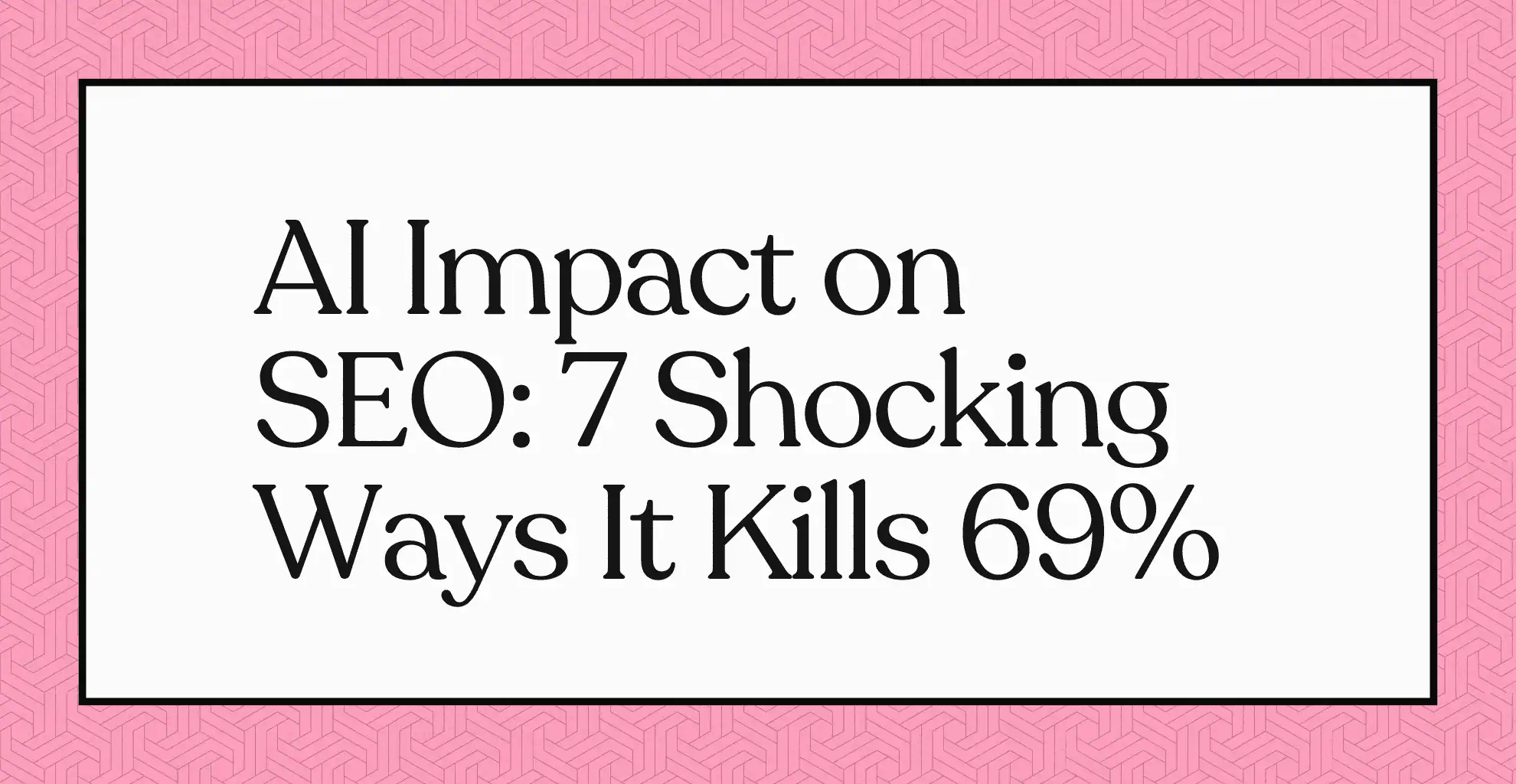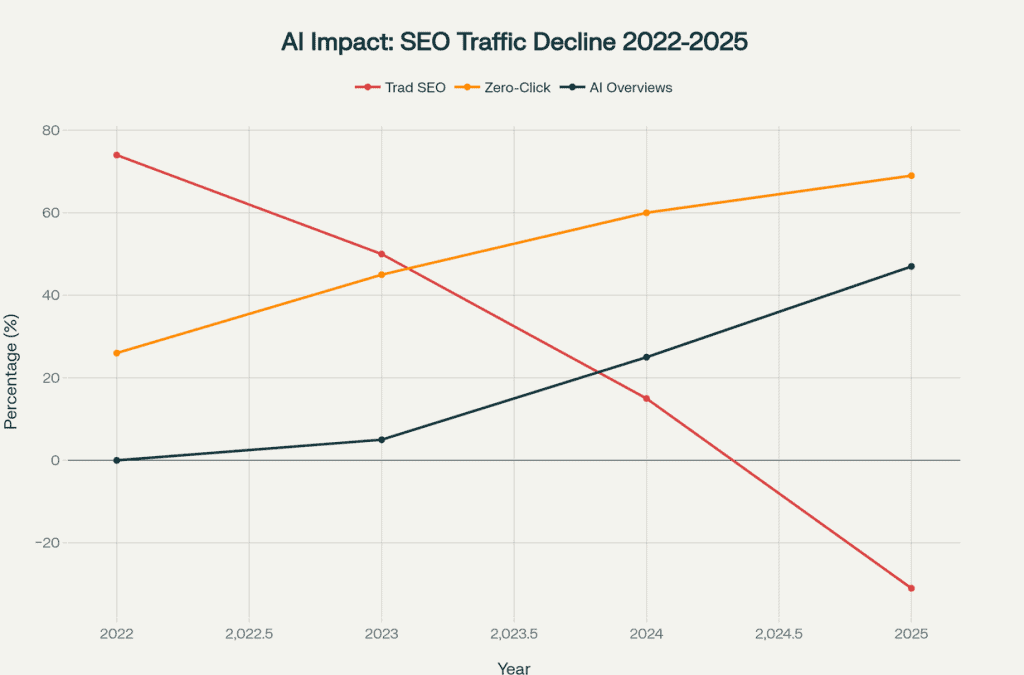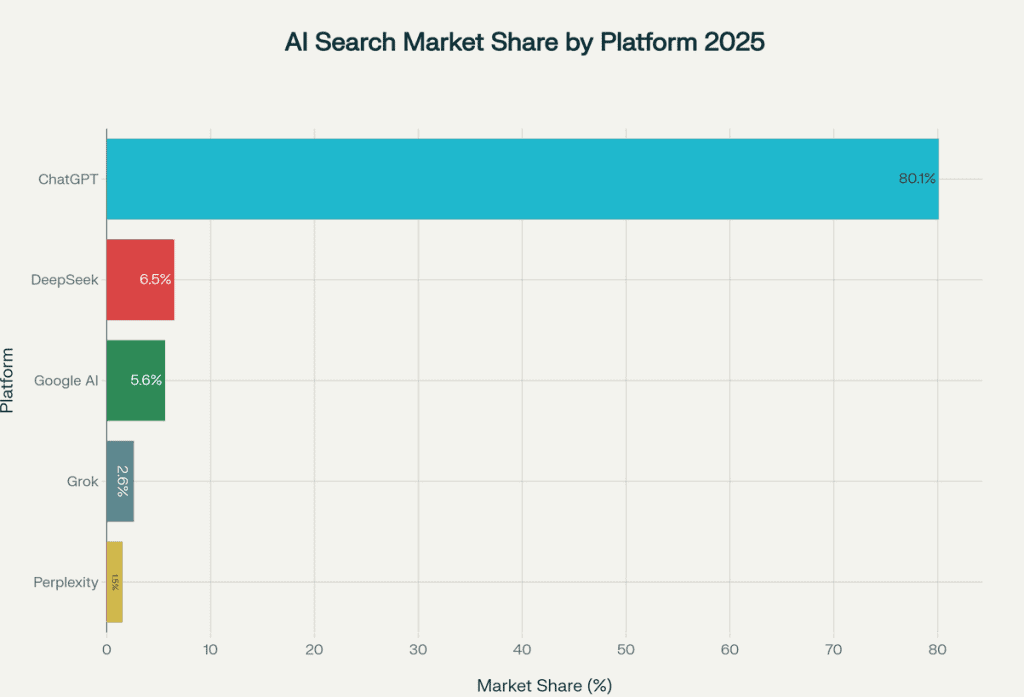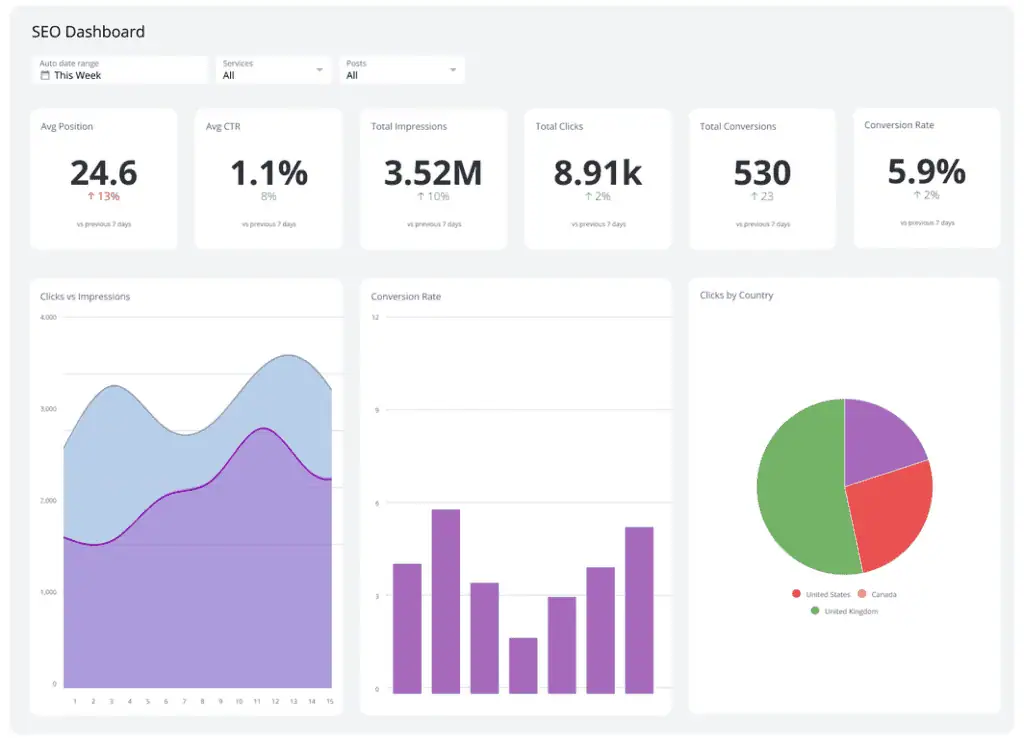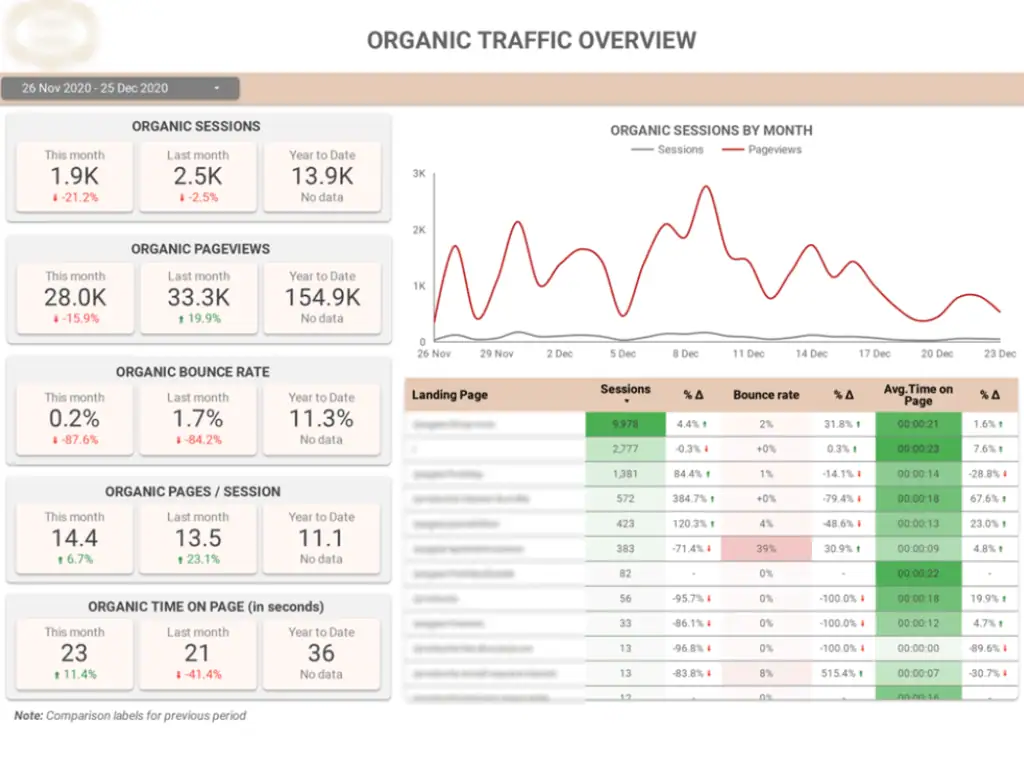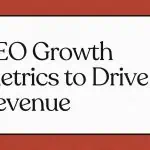Business owners often assume Page One rankings protect their visibility. The AI impact on SEO traffic proves otherwise. Artificial intelligence is dismantling long-standing search strategies, with AI-driven features removing up to 69% of organic traffic opportunities. Even highly optimized sites are losing ground as the AI impact on SEO traffic changes how consumers discover, evaluate, and engage with businesses.
In African markets, the AI impact on SEO traffic is amplified by limited digital resources and infrastructure gaps. Traditional tactics like keyword targeting and backlink building deliver diminishing returns as AI systems push zero-click results to the forefront. Strategic adaptation is now the only way to remain visible.
The AI Search Apocalypse: Understanding the New Threat Landscape
The Rise of Generative Search Engines
Generative AI search platforms now command unprecedented market influence, fundamentally altering user search behaviors across global markets. ChatGPT maintains an overwhelming 80.1% market share among AI search tools, while traditional search engines witness accelerating user migration toward conversational interfaces that provide immediate answers without requiring website visits
This transformation affects every aspect of digital discovery. Users increasingly bypass traditional “blue link” results in favor of AI-generated summaries that synthesize information from multiple sources. The implications extend beyond simple traffic metrics—entire business models predicated on website monetization face obsolescence as AI systems answer queries without generating clicks.
Search behavior analytics demonstrate alarming patterns. For every 1,000 Google searches in the United States, only 360 clicks reach non-Google properties. European markets show marginally better performance with 374 clicks per 1,000 searches, but the trajectory remains decisively negative for traditional website publishers and service providers.
Zero-Click Search Domination
Zero-click searches now represent 58.5% of American Google queries and 59.7% of European Union searches. These statistics encompass searches where users obtain sufficient information without visiting any external websites, fundamentally disrupting the traffic acquisition model that sustains most online businesses.
The zero-click phenomenon accelerates through multiple AI-powered features:
- Google AI Overviews appear in approximately 47% of search results, providing comprehensive answers above traditional listings
- Featured snippets extract content directly from websites while minimizing click-through incentives
- Knowledge panels display business information without requiring site visits
- People Also Ask sections satisfy user curiosity through expandable content previews
Mobile devices amplify zero-click impacts, with nearly half of mobile searches ending sessions entirely. This behavior pattern devastates businesses dependent on mobile traffic, particularly African SMEs where mobile internet access predominates.
The 7 Devastating AI Mechanisms Destroying SEO Traffic
1. AI Overviews: The Silent Traffic Killer
Google’s AI Overviews represent the most destructive force against traditional organic traffic. Research conducted by the Pew Research Center demonstrates that search pages featuring AI Overviews reduce click-through rates from 15% to just 8%—nearly a 50% traffic destruction rate.
AI Overviews appear for diverse query types, including commercial searches where businesses historically captured valuable leads. The feature triggers for 80% of informational queries and increasingly appears for transactional searches where purchase intent exists.
Traffic impact data reveals catastrophic losses across industries:
HuffPost experienced over 50% traffic decline following AI Overview implementation
Business Insider reported approximately 40% traffic reduction
CNN witnessed 30% traffic decrease compared to previous periods
News websites collectively face 55% traffic reduction between April 2022 and April 2025
The mechanism operates by extracting content from multiple sources to create comprehensive answers that satisfy user intent without requiring external site visits. Only 1% of AI Overview displays result in source clicks, creating a devastating impact on websites that provide the underlying information.
2. ChatGPT Search: Bypassing Traditional Discovery
ChatGPT’s explosive growth fundamentally redirects search behavior away from traditional engines. Weekly active users expanded from 100 million in October 2023 to over 800 million by April 2025—an 8x increase that represents massive search volume migration.
ChatGPT search behavior patterns demonstrate clear traffic substitution:
- Top-of-funnel queries migrate to conversational AI platforms where users seek explanations, definitions, and how-to guidance
- Research-intensive searches benefit from AI’s ability to synthesize information from multiple sources simultaneously
- Commercial investigation queries leverage AI’s comparative analysis capabilities without requiring multiple website visits
Research indicates that AI search visitors convert 4.4 times better than traditional organic search visitors, creating a double impact: reduced traffic volume combined with migration of the highest-value prospects to AI platforms.
Referral traffic analysis shows emerging patterns. Websites receive minimal traffic from AI platforms compared to Google organic results, with AI-generated citations providing negligible click-through rates despite source attribution.
3. Semantic Search Evolution: Content Relevance Redefined
AI systems fundamentally alter content evaluation criteria, prioritizing semantic relevance over traditional keyword optimization. Modern algorithms assess content depth, topical authority, and contextual relationships rather than simple keyword density metrics.
Semantic search impacts manifest through several mechanisms:
- Natural language processing favors conversational content that mirrors human speech patterns
- Entity recognition prioritizes content that clearly identifies people, places, concepts, and relationships
- Topical clustering rewards comprehensive coverage of related subtopics within specific domains
- Intent matching emphasizes content that directly addresses user goals rather than keyword variations
Traditional SEO practices become counterproductive in semantic search environments. Keyword stuffing reduces visibility while natural language optimization increases AI citation probability. Content creators must transition from keyword-centric strategies toward user-intent satisfaction models.
African SMEs face particular challenges adapting to semantic search requirements. Limited technical expertise and resource constraints complicate the transition from traditional SEO approaches toward sophisticated content strategies that satisfy AI evaluation criteria.
4. Generative Engine Optimization (GEO): The New Ranking Factor
Generative Engine Optimization emerges as the critical success factor for AI-era visibility. Unlike traditional SEO focused on search engine rankings, GEO optimizes content for citation within AI-generated responses across multiple platforms.
Research demonstrates GEO’s effectiveness, with properly optimized content achieving up to 40% visibility increases in generative engine responses. The methodology encompasses several tactical approaches:
- Citation optimization through authoritative source integration increases reference probability
- Statistical inclusion provides quantitative evidence that AI systems prefer incorporating
- Quotation formatting creates easily extractable content chunks for AI synthesis
- Structured data implementation facilitates machine-readable information processing
GEO requires fundamentally different content approaches. Rather than optimizing for specific keywords, creators must develop comprehensive resources that address entire topic clusters with sufficient depth to warrant AI citation.
Implementation barriers particularly affect African SMEs. The technical expertise required for effective GEO implementation exceeds traditional SEO requirements, creating additional challenges for resource-constrained businesses operating in developing markets.
5. Voice Search and Mobile AI Integration
The AI impact on SEO traffic is especially visible in the rapid adoption of voice search on mobile devices. Across African markets, mobile remains the dominant method of internet access, making voice search optimization a critical survival skill for local businesses. As AI assistants like Google Assistant and Siri take over mobile interactions, the AI impact on SEO traffic intensifies because these systems often bypass traditional clickable results.
- Mobile AI integration displaces traffic through several mechanisms:
- Voice assistants deliver spoken answers without showing organic listings, amplifying the AI impact on SEO traffic for informational queries.
- Predictive search features anticipate intent, narrowing the range of results shown and contributing to the AI impact on SEO traffic for competitive keywords.
- Location-based AI prioritizes proximity over broader relevance, further shaping the AI impact on SEO traffic in local service markets.
Click-through rate data underscores the severity. Over four years, position-one organic results have seen a 31% CTR drop, with mobile contributing disproportionately. This mobile-first shift compounds the AI impact on SEO traffic, particularly in regions with limited broadband infrastructure, where mobile-friendly AI features dominate the search experience.
6. E-E-A-T Algorithm Preference for AI Systems
The AI impact on SEO traffic is also shaped by how Google’s E-E-A-T (Experience, Expertise, Authoritativeness, Trustworthiness) framework interacts with AI ranking systems. These quality signals now determine both classic search rankings and AI citation likelihood, meaning that E-E-A-T optimization directly affects the AI impact on SEO traffic.
To align with AI evaluation, E-E-A-T requires:
- Detailed case studies and examples that AI can cite, reducing the negative AI impact on SEO traffic by increasing inclusion in AI responses.
- Comprehensive coverage that establishes topical authority, mitigating the AI impact on SEO traffic from incomplete content.
- Backlinks from recognized sources to strengthen authority and counter the AI impact on SEO traffic caused by low trust signals.
African SMEs often face budget limitations, making it harder to meet these criteria. Without targeted investment, the AI impact on SEO traffic remains severe, as AI systems prioritize content depth and accuracy over brand size.
7. Platform Ecosystem Lock-In and Walled Garden Effects
Major tech platforms are reinforcing walled gardens, a trend that amplifies the AI impact on SEO traffic by keeping users inside their ecosystems. Google properties alone capture around 30% of all search clicks, while AI-powered results strengthen this hold.
This occurs through:
- YouTube integration within search results, worsening the AI impact on SEO traffic for video-focused publishers
- Google Shopping bypassing merchant sites, an AI impact on SEO traffic driver for e-commerce
- Knowledge Graph and Maps displaying complete business info, intensifying the AI impact on SEO traffic for service providers
AI integration accelerates this lock-in. As AI-generated answers become richer and more precise, users need fewer external site visits, increasing the AI impact on SEO traffic and reducing revenue opportunities for smaller publishers and SMEs.
African SME Survival Strategies: Adapting to AI Dominance
Localized GEO Implementation for African Markets
African SMEs must implement Generative Engine Optimization strategies tailored to local market conditions and constraints. Unlike global markets with extensive digital infrastructure, African businesses require cost-effective approaches that maximize AI visibility within resource limitations.
Localized GEO strategies include:
- Local language optimization incorporating indigenous languages and regional dialects that AI systems increasingly recognize
- Cultural context integration reflecting local customs, practices, and preferences that enhance relevance for regional users
- Mobile-first content development optimized for the smartphone-dominant internet access patterns across African markets
- Community-focused authority building leveraging local partnerships and relationships for credibility establishment
Implementation approaches must accommodate infrastructure constraints. Limited broadband access requires content strategies that perform effectively on mobile networks while maintaining sufficient depth for AI citation consideration.
South African case studies demonstrate effective localized strategies. Businesses combining local hosting solutions with culturally relevant content achieve superior performance compared to generic optimization approaches, particularly for location-specific service providers.
Zero-Click Optimization and Brand Visibility
Rather than fighting zero-click trends, successful SMEs adapt strategies to maximize visibility within AI-generated responses. Brand awareness becomes the primary objective when direct traffic generation proves increasingly difficult.
Zero-click optimization strategies encompass:
- Featured snippet targeting through structured content that AI systems prefer extracting
- Schema markup implementation facilitating machine-readable data interpretation
- FAQ optimization addressing common customer queries in formats suitable for AI synthesis
- Local SEO intensification ensuring business information appears in location-based AI responses
Brand visibility metrics replace traditional traffic measurements. Rather than focusing exclusively on click-through rates, businesses monitor brand mention frequency, sentiment analysis, and share-of-voice within AI-generated content.
African market applications require cultural sensitivity. Local businesses must balance global AI optimization best practices with regional content preferences and communication styles that resonate with target audiences.
African market applications require cultural sensitivity. Local businesses must balance global AI optimization best practices with regional content preferences and communication styles that resonate with target audiences.
Preparing for Continued AI Evolution
Emerging AI Technologies and Search Evolution
Generative AI search capabilities continue expanding, with new features regularly introducing additional challenges for traditional SEO approaches. Market projections indicate AI search engines will achieve $41.6 billion valuation by 2033, representing an 11.2% compound annual growth rate that demonstrates sustained investment and development.
Anticipated developments include:
- Voice search integration with AI assistants becoming primary interface for mobile users
- Visual search enhancement through AI-powered image and video analysis capabilities
- Predictive search evolution anticipating user needs before explicit queries
- Personalization intensification as AI systems develop deeper individual user understanding
African market implications require careful monitoring as infrastructure development may enable rapid adoption of advanced AI features that further disrupt traditional digital marketing approaches.
Strategic Preparation Recommendations
Long-term success requires proactive adaptation rather than reactive responses to AI-driven changes. Businesses must develop flexible strategies that accommodate continued evolution while maintaining focus on core customer value delivery.
Future-proofing strategies encompass:
- Relationship-focused business models that emphasize human connections AI cannot replicate
- Unique value proposition development highlighting capabilities that complement rather than compete with AI systems
- Continuous learning commitment staying informed about AI developments and optimization opportunities
- Community integration intensification building local connections that provide competitive advantages in AI-dominated markets
African SMEs benefit from collaborative approaches that share resources and expertise for AI adaptation while maintaining individual competitive advantages through specialized local knowledge and community relationships.
Survival in the AI-Dominated Search
The transformation of search through artificial intelligence represents an extinction-level event for businesses clinging to traditional SEO methodologies. With 69% of organic traffic opportunities eliminated through zero-click searches and AI-powered features, survival demands immediate and comprehensive strategic adaptation.
African SMEs face particularly acute challenges as AI optimization requirements exceed traditional SEO complexity while local market constraints limit available resources. However, opportunities exist for businesses that embrace community-focused strategies and localized optimization approaches that leverage cultural advantages AI systems cannot replicate.
Success in the AI era requires fundamental mindset shifts from traffic generation toward brand visibility, from keyword optimization toward topical authority, and from individual competition toward collaborative community building. The businesses that thrive will be those that adapt quickly while maintaining focus on unique human value that complements rather than competes with AI capabilities.
The future belongs to organizations that master both artificial intelligence optimization and authentic human connection—a combination that positions African SMEs uniquely well for success in an AI-dominated digital landscape, provided they commit to immediate strategic transformation and continuous adaptation.
